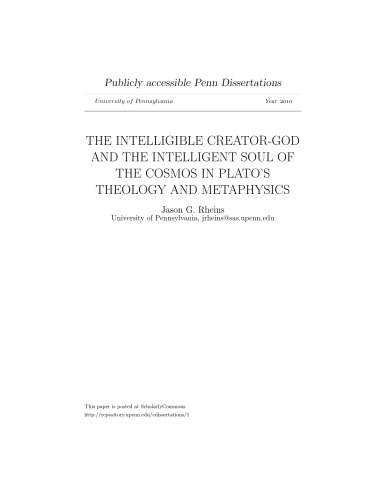

Most ebook files are in PDF format, so you can easily read them using various software such as Foxit Reader or directly on the Google Chrome browser.
Some ebook files are released by publishers in other formats such as .awz, .mobi, .epub, .fb2, etc. You may need to install specific software to read these formats on mobile/PC, such as Calibre.
Please read the tutorial at this link: https://ebookbell.com/faq
We offer FREE conversion to the popular formats you request; however, this may take some time. Therefore, right after payment, please email us, and we will try to provide the service as quickly as possible.
For some exceptional file formats or broken links (if any), please refrain from opening any disputes. Instead, email us first, and we will try to assist within a maximum of 6 hours.
EbookBell Team

5.0
58 reviewsCharles H. Kahn and Susan Sauvé Meyer
When Plato discusses the World-soul, cosmic intellect (nous), and the Demiurge, he approaches them theologically, i.e. as being the subjects of an account of the nature of the gods, but few works in the last half-century or more have addressed the ‘players’ in Plato’s theology as such. The major strata in the hierarchy of divine beings were referred to in the Neo-Platonist tradition as “hypostases”. My question is this: between intellect, the World-soul, the Demiurge, and even the Forms how many hypostases did Plato posit, what were their nature, and what overall functions did they play in his philosophical system?
I analyze Plato’s various accounts of those divine things that are immanent in the world of change (e.g. the World-soul) and those that are said to be transcendent intelligibles (e.g. the Forms and the Demiurge) in order to determine what Plato’s gods are, and what roles they play in his system. I examine the entire Platonic corpus, but I focus on Plato’s late dialogues, in which theology and cosmology receive considerably more extensive and significant treatment than they do in his earlier works. My central texts are the Philebus, Timaeus, and book X of the Laws, supplemented secondarily by the Phaedo, Phaedrus, Republic, Statesman, and Epistle VII. I also make cautious use of the testimonia regarding Plato’s so-called “unwritten doctrines”.
The invention of the World-soul is revealed to be Plato’s way of instantiating intellect in the cosmos in order to suit the demands of his natural and moral philosophy, while his esoteric account of the Demiurge resolves any tensions between his immanent theology and his metaphysics, and suggests, semi-literally, the role that timeless, intelligible goodness plays in organizing the sensible world of change.
Recommended CitationRheins, Jason G., "The Intelligible Creator-God and the Intelligent Soul of the Cosmos in Plato’s Theology and Metaphysics" (2010). Publicly Accessible Penn Dissertations. 184.
https://repository.upenn.edu/edissertations/184